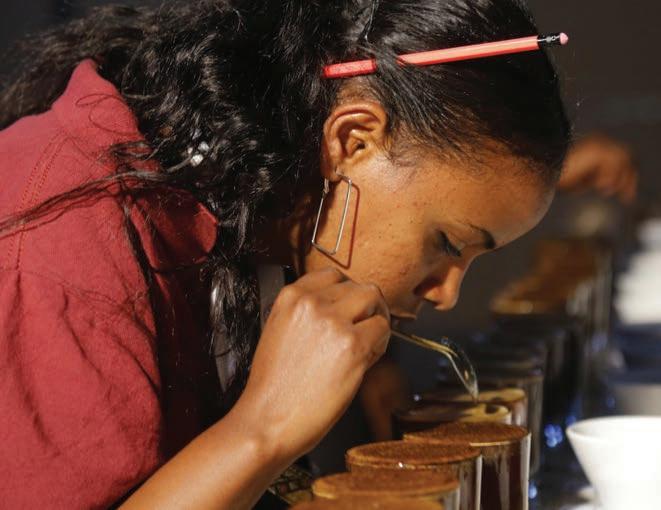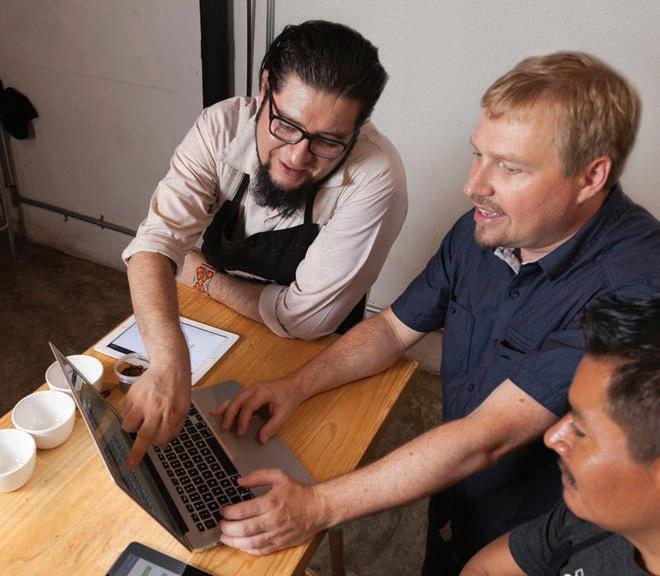
4 minute read
NEWS DRIP BY DRIP
from GCR May 2020
by Prime Group
NEWS DRIPBYDRIP
AFRICA
In 2020, Ethiopia is hosting its firstever Cup of Excellence competition, the annual Alliance for Coffee Excellence event that identifies and celebrates the highest-quality coffees around the world. While international judging occurred outside of origin due to the coronavirus pandemic, the competition aims to boost awareness of Ethiopian coffee. It is hoped the inaugural event will help drive interest at the farmer level to produce higherquality coffee.
See page 28.
AMERICAS
Since the 2016 Paris Agreement first set into motion global commitments to slow climate change by decreasing greenhouse gas emissions, companies and organisations around the world have been making their own commitments to lessen their respective carbon footprints. Coffee is no exception, with industry leaders like illycaffé and Starbucks committing to sustainable action. At origin, World Coffee Research continues its multi-location variety trial, testing a number of varieties in diverse growing regions. This includes trial sites in Zambia, where the hottest month maximum last year was 34°C. The Costa Rican Coffee Institute has also trained 8500 farmers in good agronomical practices specifically to reduce carbon emissions. At the mill level, 62 of Costa Rica’s 272 coffee mills have become low carbon and three are completely carbon neutral.
See page 12.
28
The Ethiopian Cup of Excellence will take place for the first time in 2020.
The world’s coffee supply has been threatened by climate change and low prices for several years. Now, the COVID-19 pandemic provides an additional challenge to the industry, bringing an even greater sense of urgency to the issue of economic sustainability for the sector, from farmers to consumers. The International Coffee Organization estimates the global 2019-20 output at around 168.9 million 60-kilogram bags. This is a result of lower prices as well as Brazil being in the off-year of its biennial Arabica cycle rather than any impact from the coronavirus.
See page 16.
Coffee shop culture has taken off across the world, and where it goes, the ready-to-drink market follows. A historic focus on brand recognition has led to Americanstyle RTD coffee spreading to other regions. In January 2020, US plantbased beverage company Califia Farms received US$225 million in a financing round to build on the success of its oat platform and launch other product lines. However, an increased focus on functionality could suggest a new direction for the future.
See page 20.
According to World Coffee Research’s latest study on genetic diversity, Arabica coffee plants are one of the least genetically diverse major crop species in the world. The study concluded that with a significant likelihood, Arabica derived from a spontaneous coupling of Coffea canepohra and Coffea eugonioides species.
See page 25.
In February 2020, the Colombian Government launched a Coffee Price Stabilisation Fund, worth COL$218 billion (about US$64 million) to protect producers from volatile coffee prices, which have masked a deficit of washed Arabica in the international market.
See page 32.
27,944
The number of tonnes of coffee produced by Swedish coffee roaster Löfbergs in 2019.
ASIA PACIFIC
Australia-based company Cafetto has developed a broad portfolio of products suited to different equipment and requirements to help the coffee industry maintain safe hygiene and cleaning practices.
See page 38.
DaVinci Gourmet has analysed consumer trends and psychology and implemented the results in its Pump Up The Mood campaign, which highlights fruit-based beverages, the most popular beverage category in food service across Asia.
See page 40.
Oceania has seen a rise in demand for reliable automatic coffee solutions, particularly in the corporate sector, convenience stores, and the mining industry. With the new A300, Franke Coffee Systems is ready to cater to the growing market.
See page 42.
Cropster tailors its solutions to the individual needs of its customers.
Due to Australian federal and state government measures to mitigate the risk of spreading COVID-19, MICE organisers have moved the dates of the dedicated coffee expo from May to 3 to 6 November at the Melbourne Convention and Exhibition Centre.
See page 48.
EUROPE
Swedish roaster Löfbergs has an annual turnover of SEK1.9 billion (about US$1.8 billion) and production of 27,944 tonnes of coffee, equivalent to more than 10 million cups of coffee per day. CEO Lars Appelqvist says the global coronavirus pandemic will cause a permanent behavioural shift in consumers towards at-home coffee preparation.
See page 8.
Access to reliable information is key to a business making good and quick and good decisions. Software

34
solution provider Cropster is able to integrate its service with existing platforms to provide this business intelligence to its customers.
See page 34.
Italian company Cama Group has provided secondary packaging solutions to the global coffee industry – and other food and beverage sectors – for more than 30 years. It prides itself on its flexibility and ability to adapt to the needs of its customers.
See page 36.
Nuova Simonelli is offering the most advanced espresso machine in its Appia life range to date with the Appia Life XT. The machine is dedicated to coffee shop chains in mature markets that demand advanced functions, such us precision and control.
See page 44.
After discovering the carbon emissions produced by a single cup of coffee, German roasting plant manufacturer Probat calculated the typical emissions of a roasting facility in Germany powered by natural gas to be 2608.82 tonnes of carbon emissions in its first year of operations.
See page 46.
This coronavirus has taken over the global agenda, promoting fear in the midst of uncertainty. Eversys Chief Commercial Officer Kamal Bengougam says change is inevitable, and it must be accepted without fear.
See page 48.
On 22 March, La Marzocco Honorary President Piero Bambi passed away, aged 86. He will be remembered for his contributions to the global coffee industry and his significant technological innovations.
See page 58.
$218B
The amount, in Colombian pesos, that has been committed to Colombia’s Coffee Price Stabilisation Fund.










